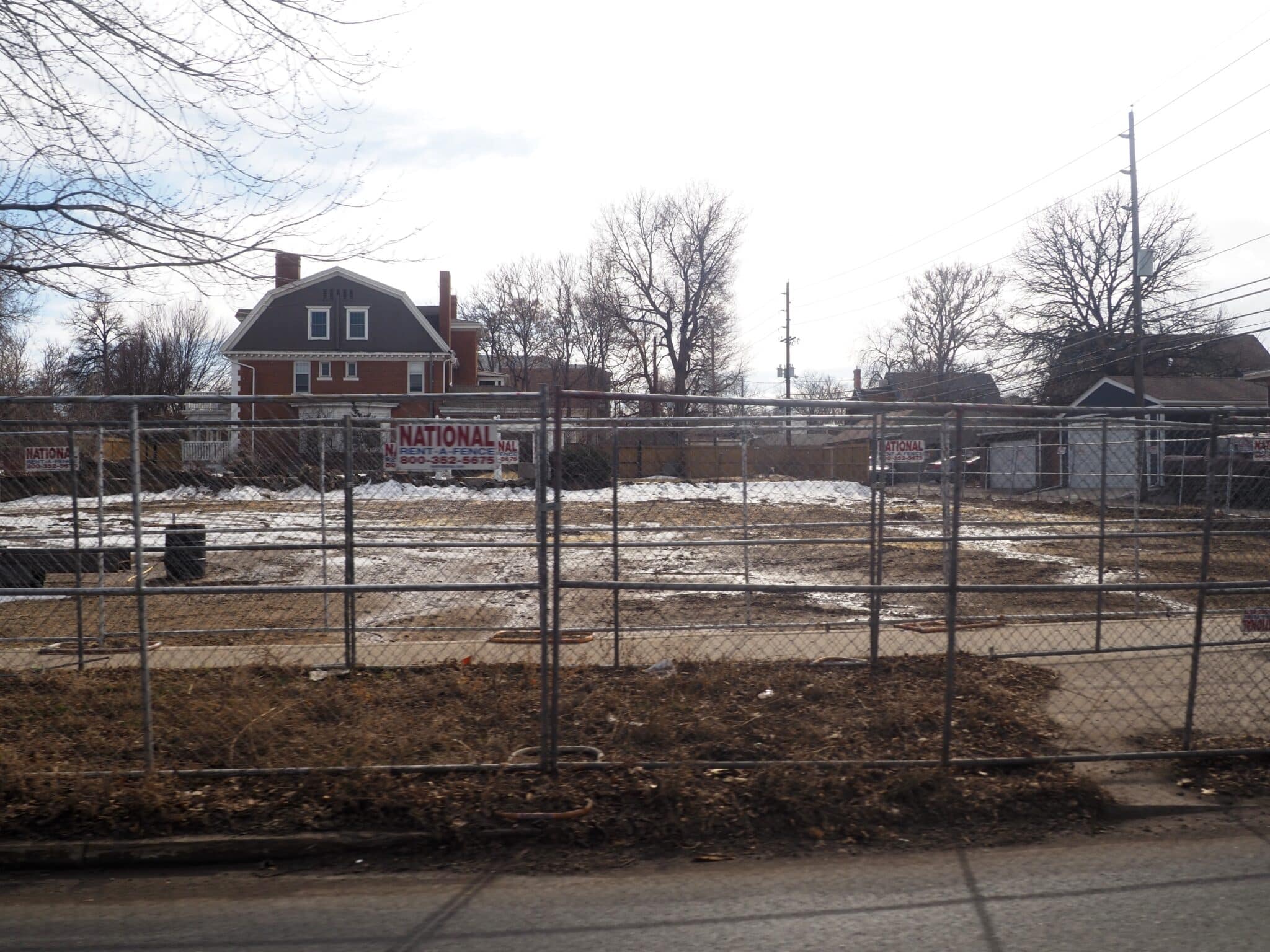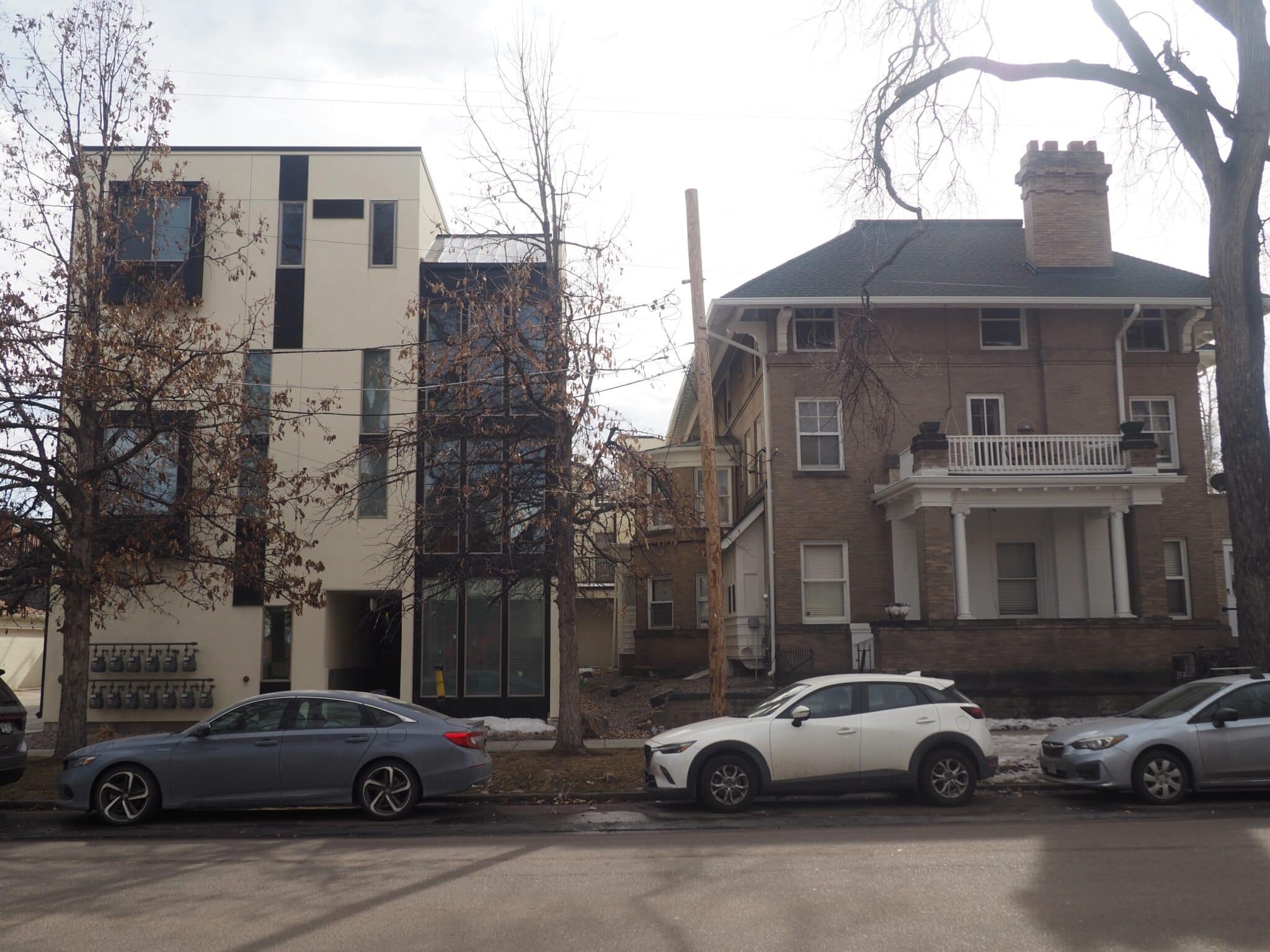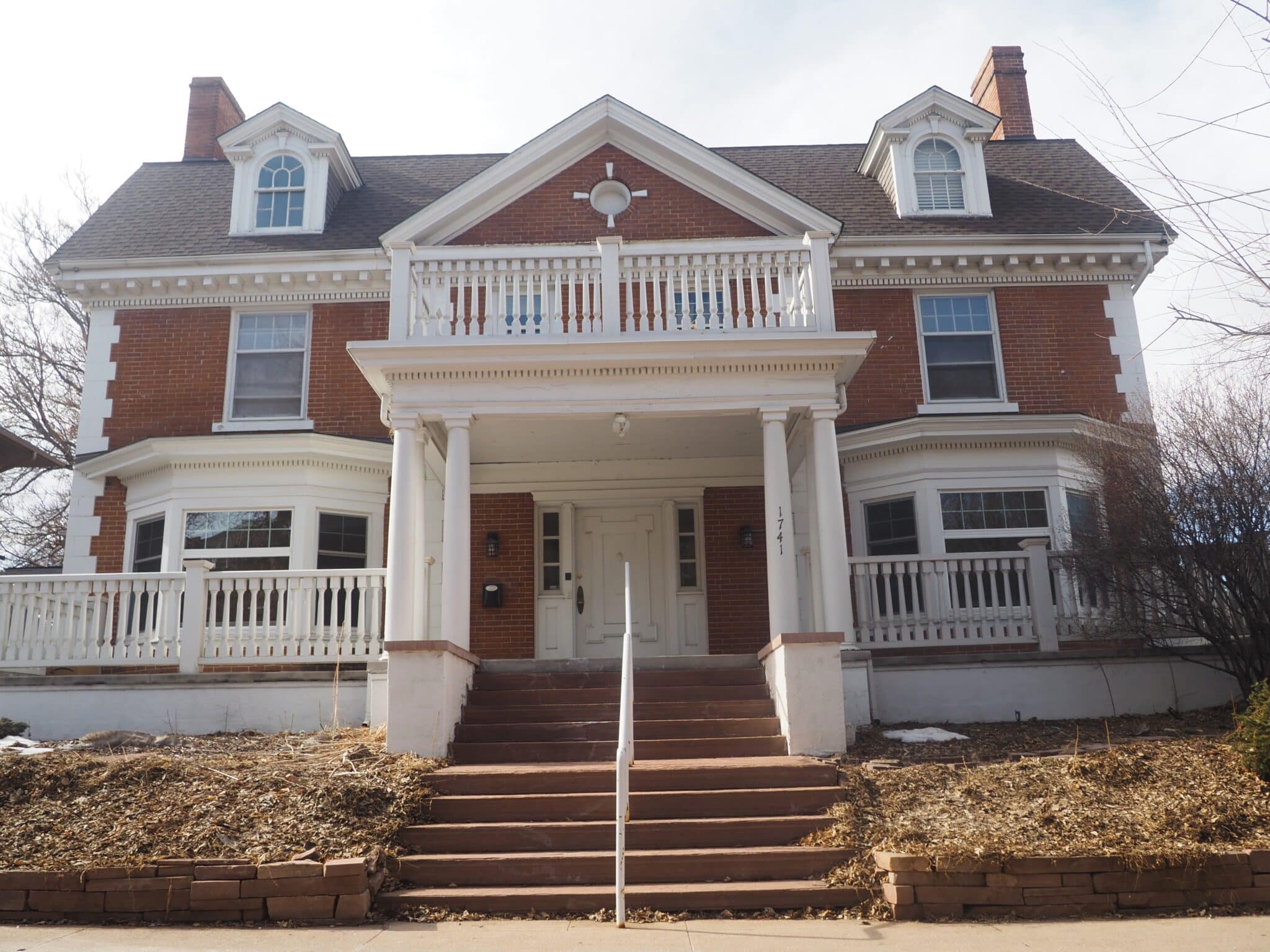City Park West is the latest Denver neighborhood to see an owner-opposed landmark designation application, this time over a vacant mansion most recently used as office space.
On one side is the man that bought the property 16 months ago, who wants to demo the structure and construct a three-story building with 37 apartments.
“They need workforce housing,” developer Mike Mathieson of Forbes Partnership said of the neighborhood.
On the other side are three nearby residents, who want to see the structure preserved and used in some fashion, while perhaps building new residential units elsewhere on the lot. The trio have the full backing of Historic Denver, the preservation-minded nonprofit.
“We’re not against developing this property,” said Scott Holder, one of the three. “Our goal is to save the house. We’re interested in adaptive reuse and multifamily development around it.”
The decision will likely come down to the Denver City Council, because mediation sessions between the two sides failed to find common ground — and Mathieson isn’t holding back on his frustrations with the process.
“We tried to work with them on every aspect,” Mathieson said. “They couldn’t perform, and now they want to take our property rights.”
Latest in a string of owner-opposed applications
Being named a city landmark effectively prevents a structure from being demolished.
Owners semi-regularly ask the city to designate their own property a landmark, which can help land tax credits.
But three Denver residents can also file a landmark application for any structure in the city, even if the owner doesn’t want the designation. This typically happens when an owner applies for demolition or a precursor to that, a certificate of demolition eligibility.
Mathieson applied for a demolition eligibility certificate for the 1741 Gaylord St. home in August. Holder and two others, Karen Herbert and Peggy Muldoon, submitted their landmark designation application earlier this month after sessions led by a city-paid mediator failed to result in an alternative resolution.
In recent years, Denver has seen one or two owner-opposed landmark applications annually.
The applications face steep odds. The council has only designated one individual building as a landmark against the wishes of its owner: the former Beth Eden Baptist Church at 3241 Lowell Blvd. in 2014.
In 2021, the council voted unanimously against landmark status for Denver7’s office building at 123 Speer Blvd. Late last year, the council voted 8-2 against landmark status for a late architect’s Cherry Creek home. A week later, an owner-opposed application for a home in Park Hill met its end at an earlier stage.
But landmark applications do sometimes produce wins, in the eyes of preservationists, by prompting compromise before a final council vote.
In 2019, different developers planned to scrape both the Tom’s Diner building at 601 E. Colfax Ave. and a shuttered funeral home in Berkeley. In both cases, alternate buyers were found after landmark applications were submitted.

Mike Mathieson is building a five-story hotel north of the 1741 Gaylord St. home, seen in the rear of this photo. (Thomas Gounley)
Owner paid $1.5M for property in 2021
Mathieson also owns the lot to the north of 1741 Gaylord, where he is preparing to construct a five-story, 74-unit building that will be leased by hotel operator Sonder.
Mathieson said he originally reached out to Judi’s House, the nonprofit that owned 1741 Gaylord, in the hopes of buying about a two-foot strip on the north edge of the property. Judi’s House didn’t want to sell it, but later came back and offered Mathieson the entire property, Mathieson said. The nonprofit founded by NFL player Brian Griese moved to Aurora last year.
Mathieson paid Judi’s House $1.5 million in October 2021 for the 7,000-square-foot structure, which sits on a 0.36-acre lot.
“We determined this house had no historical significance, and based on that we purchased the property,” Mathieson said.
To make that determination, Mathieson said, he relied in part on a report released in 2019 as part of Discover Denver, a project that aims to create a “comprehensive inventory of Denver’s historic and architecturally significant resources.”
The report compiled by an architectural historian focused on the City Park West neighborhood, and ultimately recommended Historic Denver look closely at 61 buildings that “might be architecturally significant.” The 1741 Gaylord building did not make the list, nor was it included in the report’s “areas of significance” in the neighborhood.
Mathieson points to the project’s attempt to be “comprehensive,” and the effort that went into it, in arguing his property should be in the clear.
But the report also spelled out its shortcomings. After naming the 61 properties, it said the list “should not by any means be considered to be a complete list of potentially significant properties in City Park West.” And in a spreadsheet of individual properties at the end, the entry for 1741 Gaylord says more data is needed to determine if the structure is significant.
“That data has since been obtained via recent research by the community, Historic Denver and the city’s Landmark office, all of which point to its historic and architectural significance,” Andrea Burns, interim president and CEO of Historic Denver, said in an email.
Once home to a state senator
The brick house at 1741 Gaylord St. dates to 1902. A Colorado state senator once lived there. It’s built in the Dutch Colonial Revival style.
Holder’s application argues the home should be saved in part because it’s a significant example of the work of a recognized architect: Gove & Walsh, a firm established by Aaron Gove and Thomas Walsh that operated in Denver in the early 1900s.
Mathieson, however, argues that it matters which of the men designed the home.
“Gove was a well-known architect,” he said. “Walsh was not.”
Mathieson believes Walsh or another staff member, not Gove, designed 1741 Gaylord. He noted that a History Colorado document available online, dating to 2002, does not list the home among 33 buildings credited to Gove.
Holder’s application also argues that the home’s original owner, grocer Edward Holmes Hurlbut, and later occupant James Burger, a banker and state senator from 1907 to 1911 who authored a successful bill establishing a workshop for the blind, are prominent enough to merit preservation. He said today’s successful business owners should see a bit of themselves in the home.
“This is you 120 years ago, right here,” Holder said. “That’s part of the history and culture of Denver that we’re trying to save.”
Mathieson said Burger had no meaningful legislative accomplishments — “They’re propping him up like he’s Abraham Lincoln” — and questioned how anyone could consider Hurlbut prominent.
“I’ve got more articles about me than that guy does. You’re more well-known than this guy,” he told a reporter.
Denver has plenty of large houses that have been converted to apartments or office space. In fact, multiple ones just in the 1700 block of Gaylord are used by law firms. But Holder said 1741 is clearly special.
“All you have to do is look at this house and say that’s what this ordinance is written for,” Holder said.
Mathieson called the structure “a fairly cheaply designed large house,” and said his planned redevelopment meshes with the area’s character.
“This is not some residential district,” he said. “It’s a commercial district. Which is a big difference.”
Mediation failed to find alternative
Those intending to submit an owner-opposed landmark application are required by the city to sit down with the owner and a city-paid mediator.
The hope is that the groups might find an alternative resolution that both sides can live with, so no landmark application is ever submitted and the council doesn’t have to weigh in.
Holder and Mathieson sat down with a mediator in October and January.
Holder said he and his co-applicants went in with “good-faith proposals.” They wanted to designate just the house a landmark, not the whole property, which would allow the rest of the lot to be developed. They were open to exploring how the allowed density on that portion of the lot could be increased, to partially make up for the structure staying.
Something similar was done at Mullen Mansion, on the corner of 9th and Emerson in Cap Hill.
“People love it,” Holder said. “It looks fantastic.”

A new structure, at left, was built behind the Mullen Mansion at the corner of 9th and Emerson in Cap Hill. (Thomas Gounley)
Mathieson said the problem with that is parking. Finding street parking is tough in City Park West, so everyone wants new projects to incorporate spots on-site. But he can’t do that while keeping the house, Mathieson said.
Mathieson offered to sell the property to someone interested in preserving the house, as long as his costs were covered: $1.5 million for the purchase and another $250,000 in carrying costs since then. No buyer was found.
“We didn’t have a lot of time,” Holder said. “It’s very, very unrealistic to expect … a buyer to just drop in from the sky.”
Holder then asked Mathieson to put the property on the market, and Mathieson offered to list the property for 30 days. But in return, he wanted an agreement: if no one offered $1.75 million during that time, no landmark application would be filed.
Holder told BusinessDen he found that offer “unacceptable,” and also unrealistic. There are dozens of people who’d like to see the home saved, he said. Even if he and his co-applicants didn’t submit the application, he couldn’t stop three other people from deciding to do so.
Mathieson said he also offered to give away the house for free if someone wanted to move it elsewhere.
Mathieson said Holder really just cares about one thing: stopping scrapes, the clearing of a lot that indicates something new — typically something bigger than what was previously there — is coming.
“They’re just anti-development NIMBYs,” he said.
Holder, a board member of two registered neighborhood organizations, said that’s not true. In the past, he has filed a notice of intent to submit a landmark application for other properties, leading to talks with the owners. Sometimes the owner decided not to move forward with demolition. Sometimes Holder decided a preservation push wasn’t worth it, and the structure came down.
This is the first time Holder has gone all the way, and submitted an owner-opposed landmark application.
“Walk around City Park West and walk around this stretch of Colfax and you’re not going to see this building anywhere,” he said.
Mathieson, meanwhile, said the apartments he wants to build would be affordable to those making 80 to 120 percent of the area median income, although the units wouldn’t be income-restricted.
On Tuesday, Mathieson said in an email to a city staff member that he expects to sue if the application is approved.
“This is what you have to deal with if you’re a developer in Denver,” he said.
Correction: A reference to the home not being formally listed for sale by Judi’s House prior to the sale to Mathieson was removed. The home was listed for sale, according to a Judi’s House representative.



